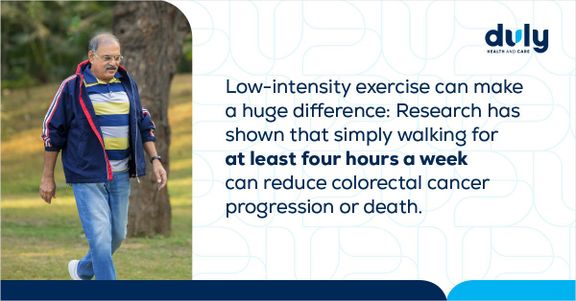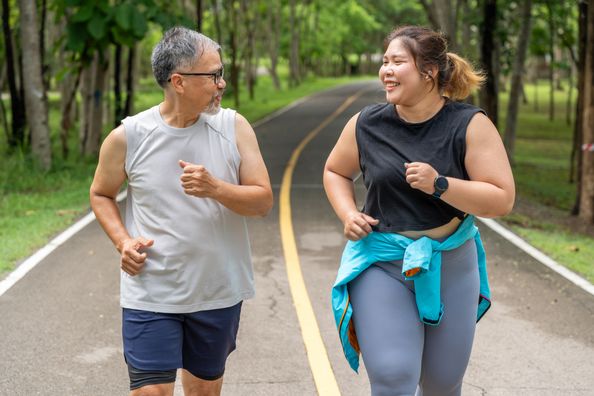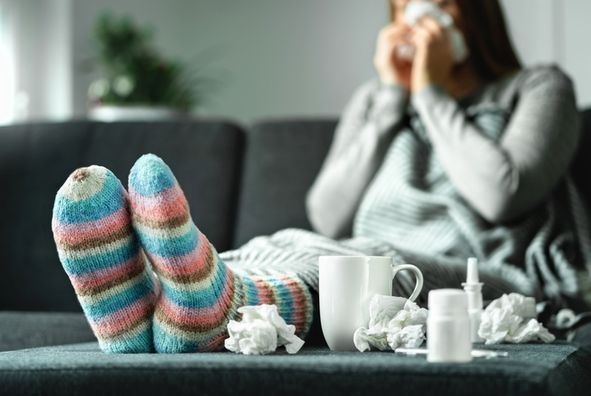A nice long run, a high-intensity kickboxing class, a strength training challenge with friends — for many people, there’s nothing like a good workout to get pumped up and energized for the day. But even for an exercise fanatic, there are times when physical activity does not sound so appealing. One of those times may be when you are undergoing treatment for colorectal cancer. When cancer or treatment are leaving you fatigued or feeling down, it can be difficult to motivate yourself to get up and exercise. While it’s important to listen to your body and get plenty of rest, it’s just as critical to stay physically active. This might not be the time to start training for a marathon or hitting the gym every single day, but it is a time to prioritize getting moving in a safe, healthy way.
Here’s why your body will thank you for staying active while you’re being treated for colorectal cancer.
Exercise can slow down the progression of colorectal cancer.
Exercise isn’t a cure for cancer, but it’s still an important part of treatment. Research from a 2019 study shows that it’s especially beneficial for people with later-stage colon cancer. The study found that being physically active may be able to slow down the progression of colorectal cancer.

The study also found that people who exercise for at least half an hour every day may be able to better tolerate the harsh effects of chemotherapy. Remember that since exercise is not a cure, you still need to keep up with your prescribed treatment plan.
Physical activity can simply make you feel better.
Between treatment, the physical effects of cancer, and the emotional toll it takes, cancer can easily diminish your quality of life. However, exercise is one of many ways to limit the effects. Exercise can help decrease anxiety and depression, which are common mental health concerns among people with cancer. It can also reduce the physical side effects of certain treatments, such as fatigue and nausea. Pairing exercise with healthy eating habits can go even further in improving quality of life, as well as helping with your physical and social functioning after treatment.
To learn more about exercise and treatments for colorectal cancer, schedule an appointment with a Duly Health and Care oncologist.
Staying active can boost your immune system.
During cancer treatment, it’s more important than ever to keep the rest of your health in check. Cancer treatments can wreak havoc on your immune system, making it harder for your body to fight off infections or illness. Additionally, other medications you may be taking for conditions like heart disease or diabetes can interfere with cancer treatments — and vice versa. For example, uncontrolled diabetes can lead to more severe side effects from treatment or increase your likelihood of getting a treatment-related infection. At the same time, certain cancer treatments can bring your blood sugar levels up or down, or worsen other health problems that you already have due to your diabetes. Exercise is key because it helps your body use blood sugar, maintain your heart and lung health, and manage your weight. It also reduces your risk of developing conditions like heart disease or diabetes in the first place.
Keeping up with physical activity could stop your cancer from coming back.
Stopping cancer treatment doesn’t mean that it’s time to stop exercising. In fact, you might want to pay even more attention to your physical activity — it has been shown to delay or reduce your likelihood of colorectal cancer coming back (recurring). Physical activity can also decrease your risk of developing other types of cancers. Exercise is one of your body’s natural defenses against disease. When you exercise, your body can regulate some of the hormones that could contribute to cancer and that keep your immune system in shape. This can then lower your risk for developing certain types of cancer, including colon, breast, prostate, endometrial, and potentially also pancreatic.
Make sure you’re staying safe.
Exercise can be safe if you have colorectal cancer — but you might need to take certain precautions or make adjustments to your usual routine. If you are being treated for colorectal cancer, you may want to avoid:
- Heavy weight training
- Using public gym equipment to avoid germs when you have a low white blood cell count (low white blood cell count could indicate that your immune system isn’t at its peak, so it may not be as good at fighting off infection)
- Vigorous, high-intensity exercise if your red blood cell count is low
- Swimming in public pools or hot tubs, lakes, or rivers, especially if you have a feeding tube or catheter
- Overdoing it — you may need to start with just a few minutes each day and build up
- Activities that put a lot of stress on your bones if your cancer has spread to your bones or caused osteoporosis
Talk to your provider about which exercises are safest and most effective, and if there is anything you should avoid while being treated.
Don’t be too hard on yourself.
Whether it’s from treatment or from the disease itself, you might not be able to exercise the same way you did before your diagnosis. Certain exercises might be more difficult or you may get tired more easily. You might also need to take more breaks or days off than you used to. That’s perfectly normal — and it’s nothing to beat yourself up about. Going through cancer treatment can be overwhelming, and you deserve to give yourself a much-needed break.
Listen to your body. If exercise is making you dizzy, have shortness of breath or chest pain, or seems to make you feel worse rather than better, these are signs to slow down.
Health Topics:








